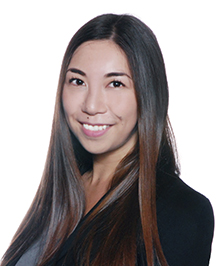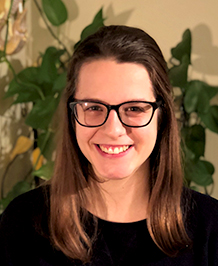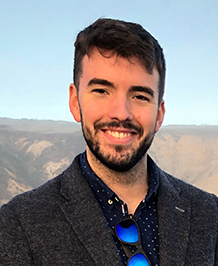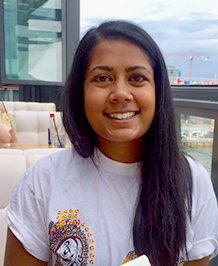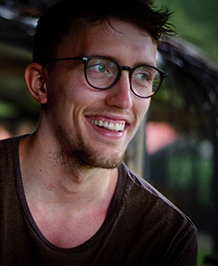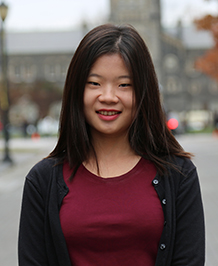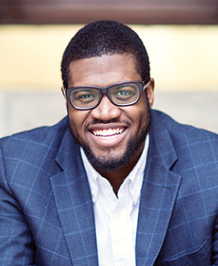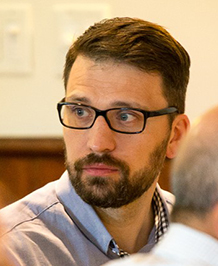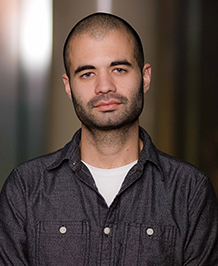Select your Research Area: Operations Research | Human Factors | Information Engineering
Learn more about Industrial Engineering: https://www.mie.utoronto.ca/industrial-engineering-research-area/
Operations Research Student Profiles
|
|
ALEXIA YEO | M.A.Sc. Operations Research (former GRD participant)
Undergraduate Program: B.Sc. Honours Physics and Mathematics, McGill University Supervisor: Prof Roy Kwon |
Current Area of Research:
My research is on solving financial portfolio optimization problems using machine learning algorithms known as message passing. This involves reformulating the original problem graphically using a node graph and reiteratively passing messages along the edges of the graph. This research is especially interesting because of its cross disciplinary nature involving concepts in financial engineering, statistical physics and computer science.
How did you learn about operations research?
I was drawn to operations research because of its direct application to everyday optimization problems and special considerations to human behavior. It is a math heavy discipline which complements my undergraduate degree well.
What do you enjoy must about being a student at MIE?
What I enjoy most about graduate school is the opportunity to take ownership of a unique research project and be the main driver behind it. I like how MIE gives me the opportunity to attend many conferences, including giving me funding to attend a conference in Houston to present my research results! I also enjoy the support of my community of fellow graduate students and the positive atmosphere the department encourages.
What are your plans after your MASc?
I will be starting at Ernst & Young in May as a technology consultant. I can’t wait to apply what I’ve learnt with the MIE operations research stream to real life business problems!
Connect with Alexia! She is happy to answer any questions you may have about her student experience!
Please indicate in email subject line: Graduate Research Days: Interested in Learning More About the Student Experience
Alexia Yeo: ayeo@mie.utoronto.ca
|
|
JUSTIN BOUTILIER | Ph.D. Operations Research (fast-track from M.A.Sc.)
Undergraduate Program: B.Sc. with honours in Mathematics, Statistics, and Economics, Acadia University Supervisor: Prof. Timothy Chan |
Current Area of Research:
My research focuses on combining both machine learning and optimization to improve the quality, access, and delivery of health care in a variety of settings. I have worked on projects ranging from emergency medical response optimization in Dhaka, Bangladesh to optimizing a drone network to deliver automated external defibrillators (AEDs) to cardiac arrest incidents in Toronto, Canada. During my PhD, I had the opportunity to travel to both India and Bangladesh to collect data, meet with local stakeholders, and disseminate my findings. I am keen on the applications of Operations Research to health issues in developing countries because I believe these regions are where some of the most significant contributions can be made. For more information about my research, visit www.individual.utoronto.ca/jboutilier
How did you learn about operations research?
I first learned about OR from an elective math course that I took when I was in my 4th year at Acadia University.
What do you enjoy must about being a student at MIE?
The research opportunities are fantastic, whether it’s travelling to international conferences or going into the field to collect data. I have been fortunate enough to travel to both India and Bangladesh to meet with local stakeholder’s and see the problem with my own eyes. These experiences have been critical for my development as a researcher. I also love living in Toronto.
What are your plans after your PhD?
To become a Professor.
Connect with Justin! He is happy to answer any questions you may have about his student experience!
Please indicate in email subject line: Graduate Research Days: Interested in Learning More About the Student Experience
Justin Boutilier: j.boutilier@mail.utoronto.ca
|
|
ISLAY WRIGHT | M.A.Sc. Operations Research
Undergraduate Program: B.Sc, Mathematics, Dalhousie University Supervisor: Prof. Timothy Chan |
Current Area of Research:
When I began my masters, I was thought I would study the more theoretical side of OR – however, I quickly realized that my favourite parts of research were helping people solve real problems. I switched to a completely applied project, which used machine learning and integer programming methods to help make decisions in amateur sport organizations. My research involved using machine learning methods to predict the demand for tennis across Canada and used facility location optimization models to determine the optimal locations to place tennis camps.
How did you learn about operations research?
I loved theoretical pure math courses in my undergrad like abstract algebra and analysis. But I also really enjoyed taking classes in political science and economics. I recall in my 3rd year studying a topic in political science and thinking that surely there were mathematical concepts that could help analyze and provide insight into these real political science problems. While researching this, I quickly came across OR, and thought it would be neat to solve real problems that I care a lot about with the math skills I had gained in my undergrad. I definitely flip-flopped a lot between wanting to pursue a more theoretical masters and an OR masters, but I was told that an OR masters could be extremely theoretical and analytical if I wanted it to be, which is what cemented my decision to study OR.
What do you enjoy must about being a student at MIE?
Being a student at MIE I was able to learn a wide breadth of material. I had this amazing foundation in math, but I came to find that my peers had backgrounds in electrical engineering, industrial engineering, physics, computer science, and more. The camaraderie within my lab was so terrific that I likely learned more from my peers than I did in any of my classes. This meant that I was constantly exposed to people who approach solving problems in very different ways than I do, and I picked up on a lot of these approaches from them.
Current Employment: Maple Leaf Sports & Entertainment (MLSE) as a Research Scientist
What is it that you do in your job? Every day I use skills I learned in my masters to solve business problems at MLSE. My foundation in math helps me approach problems with rigour and abstract-thinking. My OR masters gives me a breadth of knowledge related to real world problem-solving and communication of analytical concepts. I feel extremely confident in my abilities to solve problems at MLSE having an OR masters, and I strongly believe that having a foundation in math was the best undergrad I could have taken to prepare me for this masters.
Connect with Islay! She is happy to answer any questions you may have about her student experience!
Please indicate in email subject line: Graduate Research Days: Interested in Learning More About the Student Experience
Islay Wright: islay.wright@gmail.com
|
|
KYLE BOOTH | Ph.D. Operations Research (fast-track from M.A.Sc.)
Undergraduate Program: B.A.Sc. Mechanical Engineering (Robotics Specialization), University of Toronto Graduate Program: M.Eng, transfer to M.A.Sc., fast-track to Ph.D Supervisor: Prof Christopher Beck |
Current Area of Research:
My research lies at the intersection of operations research and robotics. I work to apply combinatorial optimization techniques, specifically mixed-integer programming (MIP) and constraint programming (CP), to multi-robot coordination problems. Additionally, I am focused on developing new algorithmic approaches within these technologies, emphasizing problem-based decompositions to boost their performance. To date I have embedded MIP and CP in a real-world multi-robot architecture using the robot operating system (ROS), and am working towards making this work more accessible to other researchers for approaching their own multi-robot planning and scheduling problems.
What drew you to Operations Research?
I have always had a fascination with finding the best possible answer to a given problem. Operations research is a great fit as it looks to, often provably, find the best possible answer to a given decision problem – whether it involve autonomous decision marking in multi-robot systems, as in my own work, or another application domain such as large-scale logistics or even space.
What do you enjoy must about being a student at MIE?
The MIE faculty allows me to truly work at the intersection of information engineering (operations research) and robotics, allowing me access to resources from each of these focus areas. I am actively involved in the Toronto Intelligent Decision Engineering Laboratory (TIDEL), and have done multiple research projects in collaboration with the Autonomous Systems and Biomechatronics Laboratory (ASBLab), leveraging the interdisciplinary structure of MIE. Not only can I design algorithmic approaches for problem solving, but I can embed them in real-world hardware which is very satisfying.
What are your plans after your Ph.D.?
I enjoy being in an academic setting and having the ability to work on multiple research projects with various flavors/emphases. I also find the teaching experiences I have been able to have thus far, through my TA involvements, to be extremely rewarding. As such, I look to continue my career in academia.
Connect with Kyle! He is happy to answer any questions you may have about his student experience!
Please indicate in email subject line: Graduate Research Days: Interested in Learning More About the Student Experience
Kyle Booth: kyle.booth@mail.utoronto.ca
Human Factors Research Student Profiles
|
|
CHELSEA CARRASCO | M.A.Sc. Human Factors Research
Undergraduate Program: B.A.Sc., Industrial Engineering, University of Toronto, Supervisor: Prof Greg Jamieson |
Current Area of Research: I currently study human-automation interaction and adaptive user interfaces in the field of cyber security. My specific area of research investigates how trust and reliance on automated recommendation systems are affected by interface adaptations which provide insight into the automation’s functionality.
What drew you to human factors research? I became interested in Human Factors Engineering when I read Don Norman’s “Design of Everyday Things” in my third year of undergrad. I was, and still am fascinated by how designing for humans can not only make technology easier to use for everyone, but also improve safety and quality of life.
What do you enjoy most as a student at MIE? The MIE community is an inclusive, social and rewarding one to be a part of. There are so many opportunities to get involved with, depending on your interests. I had the chance to organize lots of fun events as president of the human factors interest group!
What is your goal after your PhD? After my MASc my goal is to get a job in industry that utilizes my human factors expertise.
Connect with Chelsea! She is happy to answer any questions you may have about her student experience!
Please indicate in email subject line: Graduate Research Days: Interested in Learning More About the Student Experience
Chelsea Carrasco: c.carrasco@mail.utoronto.ca
|
|
SEAN KORTSCHOT | Ph.D. Human Factors Research
Undergraduate Program: B.A., Experimental Psychology, University of Western Ontario, Graduate Program: M.A.Sc., Mechanical and Industrial Engineering, University of Toronto Supervisor: Prof Greg Jamieson |
Current Area of Research: We are building adaptive user interfaces which respond to behaviourally inferred maladaptive psychological states of the operator. In other words, we are looking for patterns in user interaction with a system that are indicative of inappropriate mental states. We then adapt the interface to accommodate those states to improve operator performance.
What drew you to human factors research? I was always very interested in human psychology but was looking for a field with more direct applications of psychological research.
What do you enjoy most as a student at MIE? I really enjoy the freedom that I have with my research and being around people from different academic backgrounds.
What is your goal after your PhD? Hoping to get a R&D position at a tech company.
Connect with Sean! He is happy to answer any questions you may have about his student experience!
Please indicate in email subject line: Graduate Research Days: Interested in Learning More About the Student Experience
Sean Kortschot: sean.kortschot@mail.utoronto.ca
|
|
SOPHIA JIANG | M.A.Sc. Human Factors Research
Undergraduate Program: B.A.Sc. Chemical Engineering, University of Waterloo, Supervisor: Prof Li Shu |
Current Area of Research: How to help people overcome psychological barriers in developing creative concepts to address environmental problems.
What drew you to human factors research? While I was a student at Waterloo I had the opportunity to try out jobs in the different sectors like food, manufacturing, energy, and oil. Out of those sectors I really enjoyed working in manufacturing and energy conservation. I wanted to combine these two and study how people can create products in order to promote more environmentally conscious choices.
What do you enjoy most as a student at MIE? I enjoy being around other like-minded students.
What is your goal after your MASc? I have only started my program in Fall 2017, so I am taking the program one step at a time to keep my career options open.
Connect with Sophia! She is happy to answer any questions you may have about her student experience!
Please indicate in email subject line: Graduate Research Days: Interested in Learning More About the Student Experience
Sophia Jiang: sjiang@mie.utoronto.ca
Information Engineering Student Profiles
|
|
ANDREW FORDE | Ph.D. Information Engineering (fast track from M.A.Sc.)
Undergraduate Program: B.A.Sc. Materials Science, University of Toronto Supervisor: Prof Mark Fox |
Current Area of Research:
My research aims to identify the dimensionality of radical innovations in order to define a state space for the measurement of an idea’s radicalness and its likelihood of becoming an innovation. Developing a means of determining the degree of radicalness of an idea is important. Currently, it is not possible to facilitate the measurement of an idea a priori nor is it possible to distinguish between a radical idea without the idea being innovative.
How did you learn about information engineering?
I am a very creative person who wanted to better understand how ideas are triaged. Approaching this question from an information engineering perspective was a unique and structured approach that would create a scientific foundation for the innovation management field.
What do you enjoy must about being a student at MIE?
Access to brilliant minds. My thesis committee includes economists, engineering ontologists, computer scientists and applied mathematicians. Each with experiences and expertise that provides a rich knowledge and support base to conduct my work.
What are your plans after your Ph.D.?
To consult with companies to better improve and manage their innovation portfolios.
Connect with Andrew! He is happy to answer any questions you may have about his student experience!
Please indicate in email subject line: Graduate Research Days: Interested in Learning More About the Student Experience
Andrew Forde: andrew.forde@mail.utoronto.ca
|
|
BART GAJDEROWICZ | Ph.D. Information Engineering
Undergraduate Program: B.Sc. Computer Science, Ryerson University Graduate Program: M.Sc. Computer Science, Ryerson University Supervisor: Prof Mark Fox & Prof Michael Gruninger |
Current Area of Research:
My research investigates the problem of emulating seemingly irrational behaviour with the use of a rational reasoner. The motivating application of this thesis is the evaluation of social services policies. I combine classical artificial intelligence planning with explicit bounds and two theories from behaviour psychology: Maslow’s Hierarchy of Needs and the Emotional Cycle of Change.
What drew you to information engineering?
My background in computer science provided foundational knowledge about the implementation and analysis of artificial intelligence, various decision support systems, and database architectures. Information engineering extends this knowledge with deeper understanding of artificial intelligence and its application to the modeling of human-centric system.
What do you enjoy must about being a student at MIE?
Faculty in the department is incredibly knowledgeable, with top-tier research laboratories and projects.
What are your plans after your Ph.D.?
I am currently applying to postdoc positions, with the goal of becoming a researcher in academia or industry.
Connect with Bart! He is happy to answer any questions you may have about his student experience!
Please indicate in email subject line: Graduate Research Days: Interested in Learning More About the Student Experience
Bart Gajderowicz: bartg@mie.utoronto.ca
|
|
ELDAN COHEN | Ph.D. Information Engineering (fast-track from M.A.Sc.)
Undergraduate Program: B.Sc. Computer Science, University of Haifa Supervisor: Prof Christopher Beck |
Current Area of Research:
My research is in an area of artificial intelligence (AI) called automated planning and scheduling. My current research work analyzes how different problem characteristics impact the computational difficulty of solving it and how a better understanding of these characteristics can be used to solve automated planning problems faster.
What drew you to information engineering?
I am very interested in automated decision making and the computational methods and information systems that enable humans and organizations to make better decisions.
What do you enjoy must about being a student at MIE?
The span of research interests of the faculty allows us to be exposed to a large variety of research work and provides opportunities for collaborative work in the intersection of mechanical engineering and information engineering (for example, in robotics).
What are your plans after your Ph.D.?
Pursuing a research career in the field of artificial intelligence.
Connect with Eldan! He is happy to answer any questions you may have about his student experience!
Please indicate in email subject line: Graduate Research Days: Interested in Learning More About the Student Experience
Eldan Cohen: ecohen@mie.utoronto.ca
|
|
CARMEN CHUI | Ph.D. Information Engineering
Undergraduate Program: B.A.Sc. Industrial Engineering, University of Toronto Graduate Program: M.A.Sc. Industrial Engineering, University of Toronto Supervisor: Prof Michael Gruninger |
Current Area of Research:
My research focuses on the formal logical representations of semantic descriptions of information (ontologies) and their applications. For my Ph.D., I am developing an ontology for molecular structure to aid medicinal chemists with drug discovery and drug synthesis. A molecular structure ontology can serve as an ontology of `building blocks’ — users can build up big molecules by picking and choosing components of the ontology to combine. With an ontology, it would be possible to develop software systems to provide decision support for drug discovery.
What drew you to information engineering?
Information engineering has always interested me since undergrad; when I was in fourth year, I opted to do a research thesis and ended enjoyed it, so I decided to continue on in graduate school.
What do you enjoy must about being a student at MIE?
MIE has extremely supportive of my academic and research pursuits and I feel very fortunate to be part of this department.
What are your plans after your Ph.D.?
To apply my research in industry (e.g., help a pharmaceutical company with drug discovery or use the ontology I’ve developed in a decision support system for drug synthesis).
Connect with Carmen! She is happy to answer any questions you may have about her student experience!
Please indicate in email subject line: Graduate Research Days: Interested in Learning More About the Student Experience
Carmen Chui: cchui@mie.utoronto.ca
